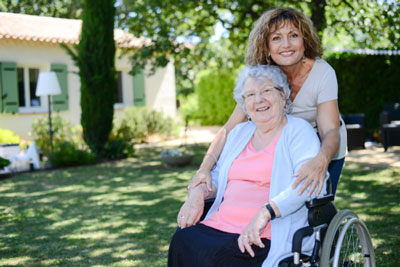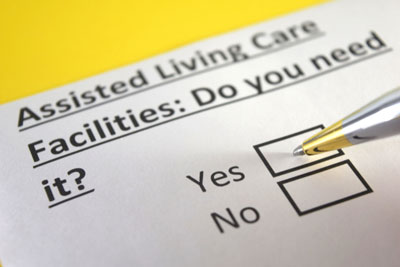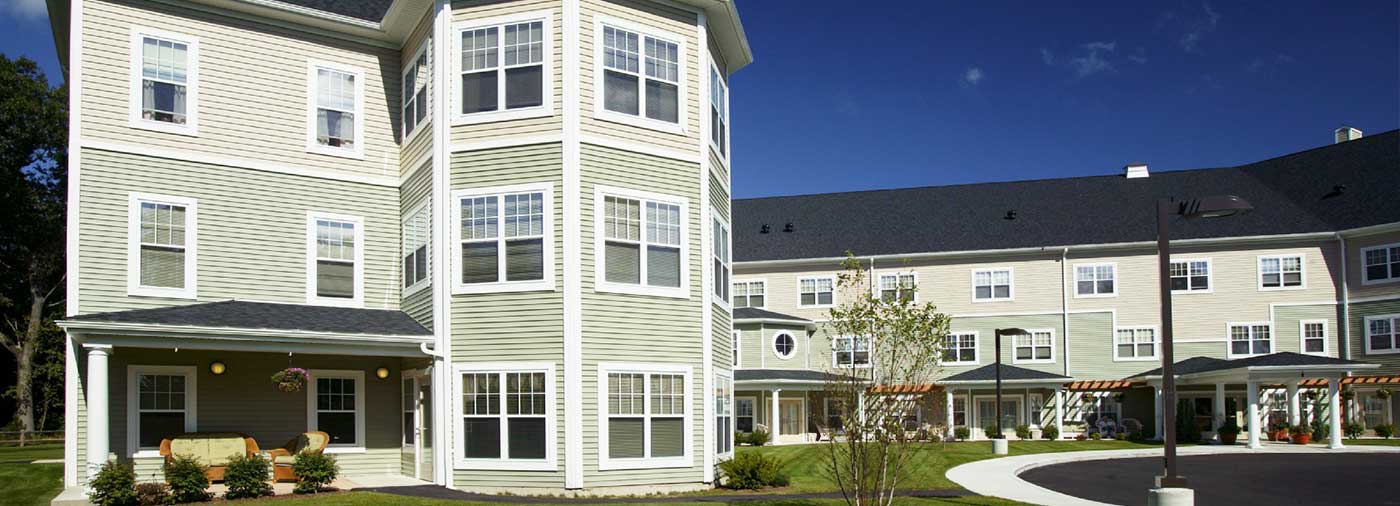The holidays are a time filled with love and laughter. These occasions often give us the opportunity to catch up with relatives and loved ones we haven’t seen during the year.
During these interactions, you might notice some changes in seniors close to you, including shifts indicating that it may be time to consider modifications in living arrangements. If that is the case, you may have to help them decide where they should live and perhaps what additional services should be brought into the home. You and your loved ones have options between many types of senior housing and in-home care alternatives available today.
Below are tips to help you determine if additional care could improve their quality of life or help them with basic activities of daily living.
What to Look For
In some cases, a senior’s need for help is obvious, but, in many cases, symptoms or life circumstances change slowly over time. You may notice your parent or other older adult is not keeping up with basic household chores or social activities, not opening or paying bills, not remembering everyday tasks or dates, or losing weight and exhibiting changes to their normal diet. These issues might signal it is time to learn more about their health and wellbeing.
Here are some signs to look for to help determine if a change is necessary.
- Memory problems – Even minor memory problems and mild dementia can affect a senior’s quality of life and interfere with their ability to fully manage their household. While forgetting a name or someone’s birthday can be distressing, issues like neglecting to take medication or not turning off the stove or oven after cooking can put their health and safety at risk. Also, keep in mind memory problems can lead to changes in personality, which can manifest as subtle changes to appearance and grooming habits.

- Inability to drive – Whether as the result of vision problems, loss of coordination, or a sudden uptick in accidents or traffic infractions, losing the ability to drive can drastically limit a senior’s independence, increasing the risk of social isolation, depression, diminished quality of life, and other health problems.
- Signs of depression or social isolation – Perhaps an older adult close to you is still relatively healthy and strong, but you’ve noticed they don’t call or leave the home as much as before. Loss of interest in personal relationships and hobbies may be a sign of depression, which can lead to other health complications for seniors.
- House isn’t kept the same as it used to be – From cooking and shopping for groceries to helping to keep the house clean and uncluttered, there are a lot things that need to be done to keep a household running. As loved ones age, completing all these tasks can start to be overwhelming and as a result, the home may start to suffer.
Tips for having a conversation about new living arrangements
If you notice your loved ones are having difficulties with everyday activities, you may need to speak with them about how you can best support them.
Attempts to discuss options may be met with denial and anger. Underlying causes of this could include:
- Pride – Independent individuals do not want to admit they can no longer do many of the things they need to do to live independently. They don’t complain, despite pain or hardship.
- Embarrassment – Elderly parents may become self-conscious or ashamed they can no longer do what they once accomplished with ease. They may need help with personal or private activities such as using the toilet or bathing. They may be experiencing financial trouble and feel embarrassed to say so. They may not be able to afford food or medications or to make needed household repairs.
- Fear – Seniors may be afraid they will no longer be able to drive or will have to go to a nursing home. They may be afraid of death or of suffering and pain.
- Depression – Elderly loved ones who are depressed may not talk as much as they used to. They may smile less and look sad. They may have lost the joy of life and express feeling useless or even long for death.
Caring for elderly parents can be a challenge and talking to those in denial is difficult and can lead to hurt feelings or guilt. If the message you are hearing is: “There is nothing to talk about,” it may be helpful to keep the following in mind:
- Return to the conversation another day – Sometimes it is best to leave the subject alone if you are not in crisis. Talking to elderly parents is a process, not a one-time chat.
- Prepare yourself for the discussion – Talk about what you have observed and be honest about your concerns. Present choices. An example might be getting a housekeeper to come in twice a month, or a personal companion who can prepare meals and do light chores.
- Explain the possible consequences of doing nothing – Getting some help could mean staying in the family home or moving to an independent or assisted living residence versus going to a nursing home. A regular medical checkup could catch something early while it can be treated effectively.
- Talk to siblings beforehand – This can help you discuss options and build consensus. If only one of your parents needs assistance, be sure to talk with your other parent so you are all of like mind.

Get information about dealing with elderly parents in denial
- Enlist help from other resources – It can be very useful to talk to a geriatric care manager, clergy member or counselor who can provide guidance or help lead or mediate the conversations.
- Begin your discussion by validating their feelings – Let them know you understand what may be going on and ask them how they feel.
- Be mindful when talking to them – Eliminate distractions and potential interruptions from phones, televisions and young children. Pay careful attention without judgment. Be totally present – not just physically, but mentally and emotionally as well.
- Start with a gentle question – Open the discussion with something like, “Do you mind if I ask you about some things I’ve noticed that concern me?” It gives your parent a moment to think and to plan emotionally for what might be a touchy conversation.
- Be an active listener – Focus your attention on and maintain good eye contact with your parent to show understanding and empathy. Summarize what your parent is saying and repeat it back to them to be sure you understood them correctly.
- Gently remind your parent it’s okay to ask for help – No one (who matters) is going to think less of them.
Sometimes things don’t go as well as planned. If you are not making progress toward getting them the help they need, gently, but firmly set your own boundaries. Let parents know if they choose to do nothing to help themselves, you will be the one having to deal with the repercussions. Advise them on what you can and cannot do in that situation. If things regress to a crisis or if there is a question of competency, undue influence, or self-neglect, you may need to talk to an attorney about guardianship proceedings.
Difficult discussions about age-related changes will be less frustrating for everyone if there is a sincere understanding you are concerned for your loved one’s safety and health. Be sure to emphasize your desire to open the discussion and bring options to them, so they can make the decisions best for all.
Options to support your loved ones
There are various adult living settings available based on an individual’s needs and preferences. Sometimes a home residence is best, but in many cases, the amenities and activities of a larger community will be more suitable. Assessments by health professionals, geographical location, physical and medical needs, preferences, lifestyles, and financial matters will all play a part in the final selection.

Discover more about resources for aging in place
- Learn about hiring a home health aide
- Read about the five signs your loved one may need caregiving support
Aging in place
If your parent’s needs are well-suited to staying in the home, there are alternatives you can explore.
Home care
A home health aide can serve as a bridge between seniors and their healthcare providers and allow them to remain at home longer. Home care can include several types of services, delivered in a person’s home setting.
- Visiting Nurses Associations (VNA) work with physicians to provide patients with rehabilitation, nursing, social service, and specialized care tailored to each individual’s unique needs and situation.
- Home health workers perform a broad range of services, including help with medications, doctor’s appointments, light housekeeping, and personal grooming. The level of service provided is based on specific needs. When looking for a home health aide, make sure the agencies you are considering perform CORI checks on their staff.
- Hospice care’s professional, interdisciplinary team is devoted to optimizing the remainder of life for patients, including providing support and peace of mind for the people closest to them.
Care in an alternative setting
To support your loved one’s evolving requirements, sometimes it is necessary for them to change their living arrangements. There are a variety of options to meet a wide array of needs as you focus on taking care of your elderly parents.
Independent Living
Seniors who are looking to downsize and shed many of the responsibilities of maintaining a household are well-suited to independent living. Offering a maintenance-free apartment or condominium, the communities also provide meals, housekeeping, transportation, and an array of activities.
How to plan for long-term care
Assisted living
Designed for older adults for whom some level of daily assistance is needed, assisted living communities offer a wide range of services. Communal meals are offered, but apartments often include kitchenettes. Housekeeping, amenities, activities, and supervision round out a secure living plan.
Skilled nursing care
Some older adults require medical care and supervision with 24-hour nursing. Skilled nursing may be temporary for rehabilitation care or more long-term.

See what to do when caring for an older adult becomes too difficult
Memory care
Many older adults benefit from the supervision, stimulation, safety, and specialized care found in a community residence offering “memory care” programs. Memory care is for people living with memory loss, dementia, or Alzheimer’s disease and programs can be found in assisted living residences and skilled nursing centers.
Continuing care retirement community (CCRC)
CCRCs offer a continuum of care, from independent living to assisted living and skilled nursing care. Various levels of housing and care may be situated on different floors or in different, physically adjacent buildings located on the same campus. The CCRC model enables residents to stay within the same environment if and when their needs change and a higher level of care is required.
If you think it may be time for your senior parents to get a little help in the home or to seek alternative living arrangements like assisted living or skilled nursing care, we’re here to help. To learn more about the options available at SALMON Health and Retirement, contact us today by calling 888-339-9382 for more information.
About Us
Organizations such as SALMON Health and Retirement are ready and able to offer assistance so your loved one can have their best life possible, even as their needs increase. SALMON Health and Retirement provides a full spectrum of senior living choices and helps support your caregiving efforts. To learn more about the options available to you and your loved ones, contact us today by calling 888-587-4409 for more information.




